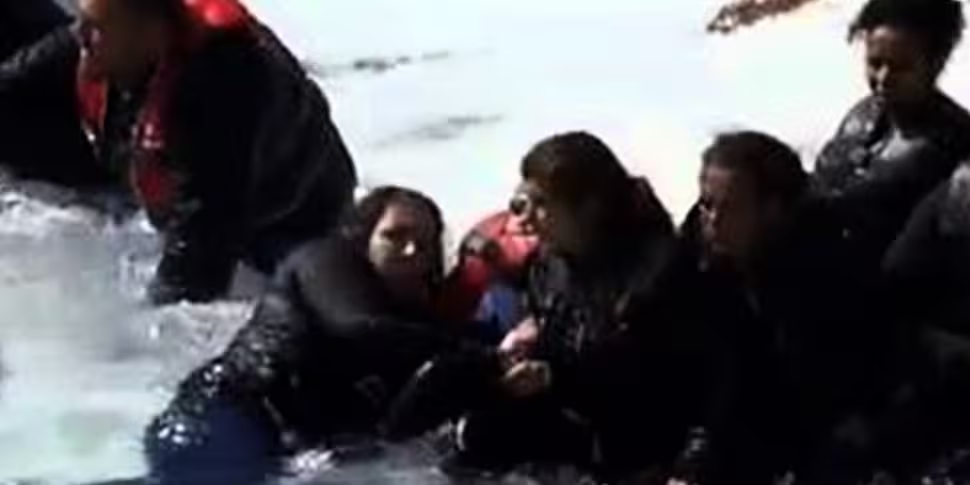European Union minsters have agreed a ten point plan on migration, to tackle the crisis in the Mediterranean.
A statement issued this evening says the ten actions agreed are direct, substantial measures to make an immediate difference.
The plan includes reinforcing joint operations in the Mediterranean and a systematic effort to capture and destroy vessels used by smugglers.
Extra teams are to be deployed in Italy and Greece to process asylum applications and Member States are to ensure fingerprinting of all migrants.
The EU is also considering options for an emergency relocation mechanism - and a pilot project on resettlement is to be set up, offering a number of places to people in need of protection.
You can read the full ten point plan here.
Announcing the plan, High Representative / Vice-President Federica Mogherini and Commissioner Dimitris Avramopoulos jointly said, "we need to show that same collective European sense of urgency we have consistently shown in reacting in times of crisis. The dire situation in the Mediterranean is not a new nor a passing reality.
"That is why the Commission will come forward with a comprehensive European Agenda on Migration in May to address the structural problems."
Colm O'Gorman of Amnesty has criticised the EU's approach. He says it is more concerned with protecting borders than people:
Pablo Rojas Coppari of the Migrant Rights Centre spoke to Shane Coleman on The Right Hook about the plight facing migrants, He explained that the issue has recently intensified and it marks a 'humanitarian crisis':
European leaders have been coming under growing pressure to tackle people-smugglers following what could be the Mediterranean's deadliest migrant tragedy.
An emergency EU summit has been called for later this week after as many as 950 people were feared drowned in a shipwreck off Libya.
Europe has been accused by United Nations' human rights chief Zeid Ra'ad Al Hussein of a "monumental failure of compassion" over the issue.
He said: "Europe is turning its back on some of the most vulnerable migrants in the world and risks turning the Mediterranean into a vast cemetery."
Twenty-eight known survivors, including young children, were plucked from the sea near the Italian island of Lampedusa on Sunday.
Body bags containing 24 corpses of those who drowned arrived in Malta earlier. There are fears hundreds more were in a locked in the hold.
The numbers of people dying during the perilous crossing from North Africa to Europe increased even further on Monday.
Italian and Maltese ships have been responding to distress calls from two more boats, with at least 20 people believed to have drowned.
Three people also died when a vessel they were in ran aground off the Greek island of Rhodes.
Crisis
There has been a surge in migrants trying to reach European shores - usually Italy and Malta - as people flee conflict, repression and poverty in the Middle East and Africa.
At least 1,500 are believed to have drowned in the Mediterranean this year alone.
However, Save the Children said ministers had "dithered" over the issues in Luxembourg.
The charity's chief executive, Justin Forsyth, said: "With each day we delay, we lose more innocent lives and Europe slips further into an immoral abyss.
"Right now, people desperately seeking a better life are drowning in politics."
He said the emergency summit in Brussels on Thursday - demanded by Italian Prime Minister Matteo Renzi in the wake of the disaster near Lampedusa - is now a "matter of life and death".
Mr Renzi's country has taken the brunt of the recent influx and the rescue effort - the Italian Navy and coastguard brought more than 13,000 people ashore in the space of just a week.
Italy closed its dedicated maritime search and rescue mission last year after it was unable to persuade European partners, including Britain, to help meet its €9m monthly operating costs.
Migrants heading for Europe from Africa often congregate in Libya where unrest has made it much easier for people-smugglers to operate.
British Prime Minister David Cameron, who will break off from election campaigning to attend Thursday's meeting, said a "comprehensive plan" was needed to improve search and rescue "but, crucially, we have got to do more to deal with the problems in the countries from which these people are coming".
Originally published at 12.30pm









